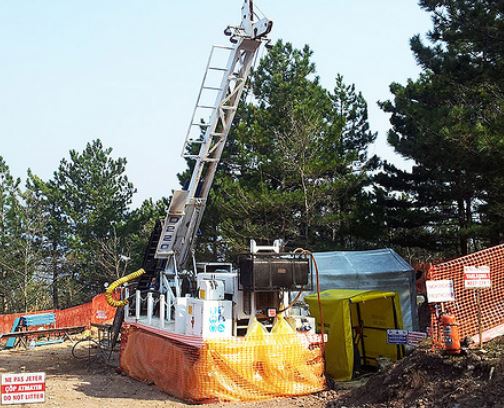Alamos Gold halts construction in Turkey

Drilling operations at Alamos Gold's Kirazli gold-silver project in Turkey. Source: Alamos Gold Inc.
Alamos Gold Inc. [AGI-TSX, NYSE] has suspended all construction activities on its Kirazli project pending renewal of its Turkish mining concessions which expired on October 13, 2019.
“Although the mining concessions have not been revoked and can be renewed following this expiration date, no further construction activities can be completed until the concessions have been renewed,” Alamos said in a press release on October 14, 2019.
The company went on to say that there has been false information about the project circulated through social media. “The company continues to share correct information about the project, and dispel misinformation which gave rise to protests and social media inaccuracies concerning the Kirazli project,” the company said.
Alamos shares declined on the news, falling 10% or 76 cents to $6.74. The shares are currently trading in a 52-week range of $3.88 and $10.12.
Alamos is a Canadian-based intermediate gold producer with diversified production from four operating mines in North America, including the Young-Davidson, and Island Gold mines in northern Ontario, and the Mulatos and El Chanate mines in Sonora Mexico.
The company has said it expects to produce between 480,000 and 520,000 ounces of gold this year, rising to 600,000 ounces in 2021. The forecasted increase in 2021 was expected to reflect a full year of production from the Kirazli project.
The project is located in Canakkale Province on the Biga Peninsula of northwestern Turkey. It will be an open pit, heap leach operation, producing both gold and silver.
Kirazli is one of two 100%-owned Turkish projects that Alamos acquired from Teck Resources Ltd. [TECK.B-TSX; TECK.A-TSX; TECK-NYSE] and Fronteer Development for $90 million in January, 2010. The other is the Agi Dagi project, which is also located in Canakkale Province about 25 km from Kirazli.
The Kirazli project covers 1,514 hectares of mineral tenures in two contiguous licenses covering a prominent northwest trending ridge with 500 metres of relief. As the project is located in a forestry reserve, surface rights are controlled by the State government of Canakkale.
As outlined in a 2017 feasibility study, Kirazli has a 44% after-tax internal rate of return and is expected to produce over 100,000 ounces of gold during its first full year of production at mine-site all-in sustaining costs of less than $400 an ounce.
The initial capital estimate for Kirazli was expected to be $152 million, of which $50 to $60 million was slated to be spent in 2018, and most of the balance in 2019 and the first half of 2020. Based on previously estimated timelines, the company was anticipating initial production from Kirazli in late 2020. However, given the uncertainty around the timing of the concession renewal, initial production has been delayed from previous guidance.
“The company will provide updated guidance on the construction schedule and budget for Kirazli following the receipt of the concession renewal and resumption of construction activities,” Alamos said in its press release.
